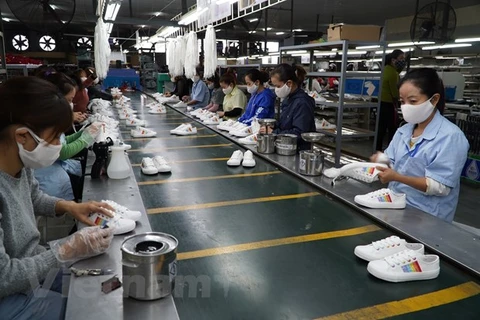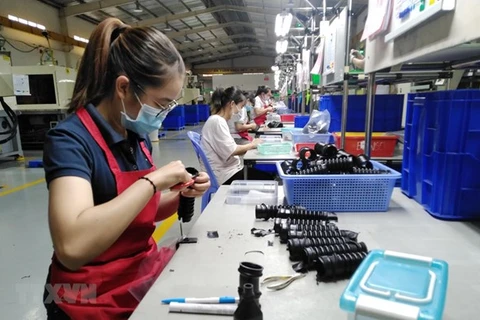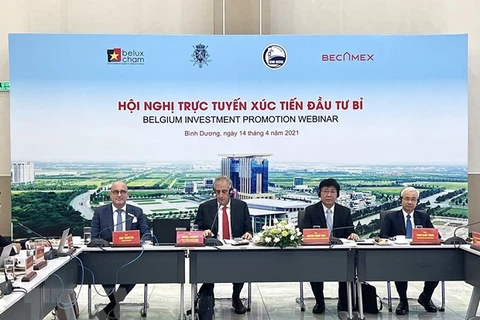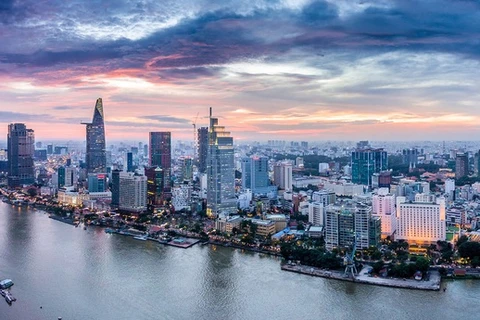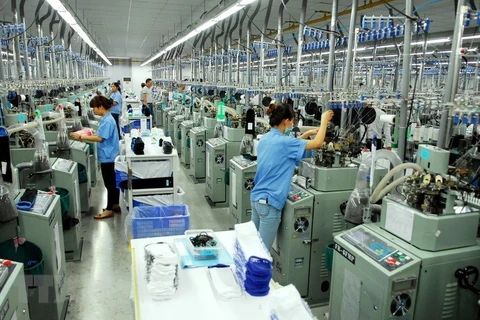Hanoi (VNA) - Hanoi has compiled a plan on attracting between 30 and 40 billion USD worth of foreign direct investment (FDI) during the 2021-2025 period, Deputy Director of the municipal Department of Planning and Investment Vu Duy Tuan told a working session with local authorities on April 19.
According to Tuan, during the 2016-2020 period, the city attracted 3,113 foreign-funded projects worth 26.5 billion USD, 4.2 times higher than the capital recorded in the previous five-year period.
To date, of 33 key projects, 11 have been completed in line with plans, 15 are under construction, and 12 are about to begin.
Meanwhile, as of March 31, there were 2,907 projects worth 1.65 quadrillion VND (71.52 billion USD) not funded by the local budget. Of these, 967 have been completed and 182 had stopped or had their licences revoked.
At the meeting, Chairman of the municipal People’s Committee Chu Ngoc Anh asked the department to follow the city’s goals and working programmes to actively issue related plans or make proposals to local authorities.
He ordered the department to quickly review the local list of key projects and suggest new ones for the 2021-2025 period, adding that the proposed projects ought to be helpful in boosting the city’s socio-economic growth and also prove feasible.
Anh also requested smooth and close coordination between the department and relevant sectors and localities.
Earlier on the same day, he inspected single-window units under the city’s multi-agency area and at the department.
Kyle Kelhofer, Country Manager for Vietnam, Cambodia and Laos at the International Finance Corporation (IFC), recently pointed out Hanoi’s advantages that favour high-tech projects, especially infrastructure and high-quality human resources.
Forty-one percent of Japanese firms, meanwhile, have considered expanding their operations in Vietnam over the next three years, according to Takeo Nakajima, Chief Representative of the Japan External Trade Organisation (JETRO) in Hanoi.
Hanoi should therefore bring into full play its position as one of the top 10 localities nationwide in the provincial competitiveness index (PCI) in order to attract even more Japanese investment, he suggested.
Experts, however, have said the city must address issues such as the slow development of industrial zones and clusters, high land rentals, and small-scale support industry, to attract high-quality FDI projects.
According to the municipal Department of Planning and Investment, the number of businesses using cutting-edge technologies and modern management and environmental protection methods is expected to increase by 50 percent by 2025 compared to 2018, while the rate of locally-made content is to reach 30 percent.
To that end, the department said Hanoi will continue to target quality projects, especially with partners such as Japan, the United States and Europe, to step up technology transfer.
The Minister of Planning and Investment said that developing digital technology, precision mechanics, automation, and semi-conductor technology will push ahead with Hanoi’s industrialisation and modernisation.
The official suggested the capital city develop a number of urban economic models, saying it is likely to become the country’s creative centre.
It is working to improve its business environment, devise a plan for the support industry by 2025, and complete industrial parks and clusters and transport infrastructure, while building e-government to make business registration and tax declarations and payments easier for enterprises.
Phan Duc Hieu, deputy head of the Central Institute for Economic Management at the Ministry of Planning and Investment, said Hanoi should employ mechanisms that help promote links between domestic and foreign firms, encourage multi-national groups to invest in the city, and develop creative and innovation centres.
Local authorities have regularly held dialogue with investors and helped them seek development opportunities by removing difficulties./.
According to Tuan, during the 2016-2020 period, the city attracted 3,113 foreign-funded projects worth 26.5 billion USD, 4.2 times higher than the capital recorded in the previous five-year period.
To date, of 33 key projects, 11 have been completed in line with plans, 15 are under construction, and 12 are about to begin.
Meanwhile, as of March 31, there were 2,907 projects worth 1.65 quadrillion VND (71.52 billion USD) not funded by the local budget. Of these, 967 have been completed and 182 had stopped or had their licences revoked.
At the meeting, Chairman of the municipal People’s Committee Chu Ngoc Anh asked the department to follow the city’s goals and working programmes to actively issue related plans or make proposals to local authorities.
He ordered the department to quickly review the local list of key projects and suggest new ones for the 2021-2025 period, adding that the proposed projects ought to be helpful in boosting the city’s socio-economic growth and also prove feasible.
Anh also requested smooth and close coordination between the department and relevant sectors and localities.
Earlier on the same day, he inspected single-window units under the city’s multi-agency area and at the department.
Kyle Kelhofer, Country Manager for Vietnam, Cambodia and Laos at the International Finance Corporation (IFC), recently pointed out Hanoi’s advantages that favour high-tech projects, especially infrastructure and high-quality human resources.
Forty-one percent of Japanese firms, meanwhile, have considered expanding their operations in Vietnam over the next three years, according to Takeo Nakajima, Chief Representative of the Japan External Trade Organisation (JETRO) in Hanoi.
Hanoi should therefore bring into full play its position as one of the top 10 localities nationwide in the provincial competitiveness index (PCI) in order to attract even more Japanese investment, he suggested.
Experts, however, have said the city must address issues such as the slow development of industrial zones and clusters, high land rentals, and small-scale support industry, to attract high-quality FDI projects.
According to the municipal Department of Planning and Investment, the number of businesses using cutting-edge technologies and modern management and environmental protection methods is expected to increase by 50 percent by 2025 compared to 2018, while the rate of locally-made content is to reach 30 percent.
To that end, the department said Hanoi will continue to target quality projects, especially with partners such as Japan, the United States and Europe, to step up technology transfer.
The Minister of Planning and Investment said that developing digital technology, precision mechanics, automation, and semi-conductor technology will push ahead with Hanoi’s industrialisation and modernisation.
The official suggested the capital city develop a number of urban economic models, saying it is likely to become the country’s creative centre.
It is working to improve its business environment, devise a plan for the support industry by 2025, and complete industrial parks and clusters and transport infrastructure, while building e-government to make business registration and tax declarations and payments easier for enterprises.
Phan Duc Hieu, deputy head of the Central Institute for Economic Management at the Ministry of Planning and Investment, said Hanoi should employ mechanisms that help promote links between domestic and foreign firms, encourage multi-national groups to invest in the city, and develop creative and innovation centres.
Local authorities have regularly held dialogue with investors and helped them seek development opportunities by removing difficulties./.
VNA

